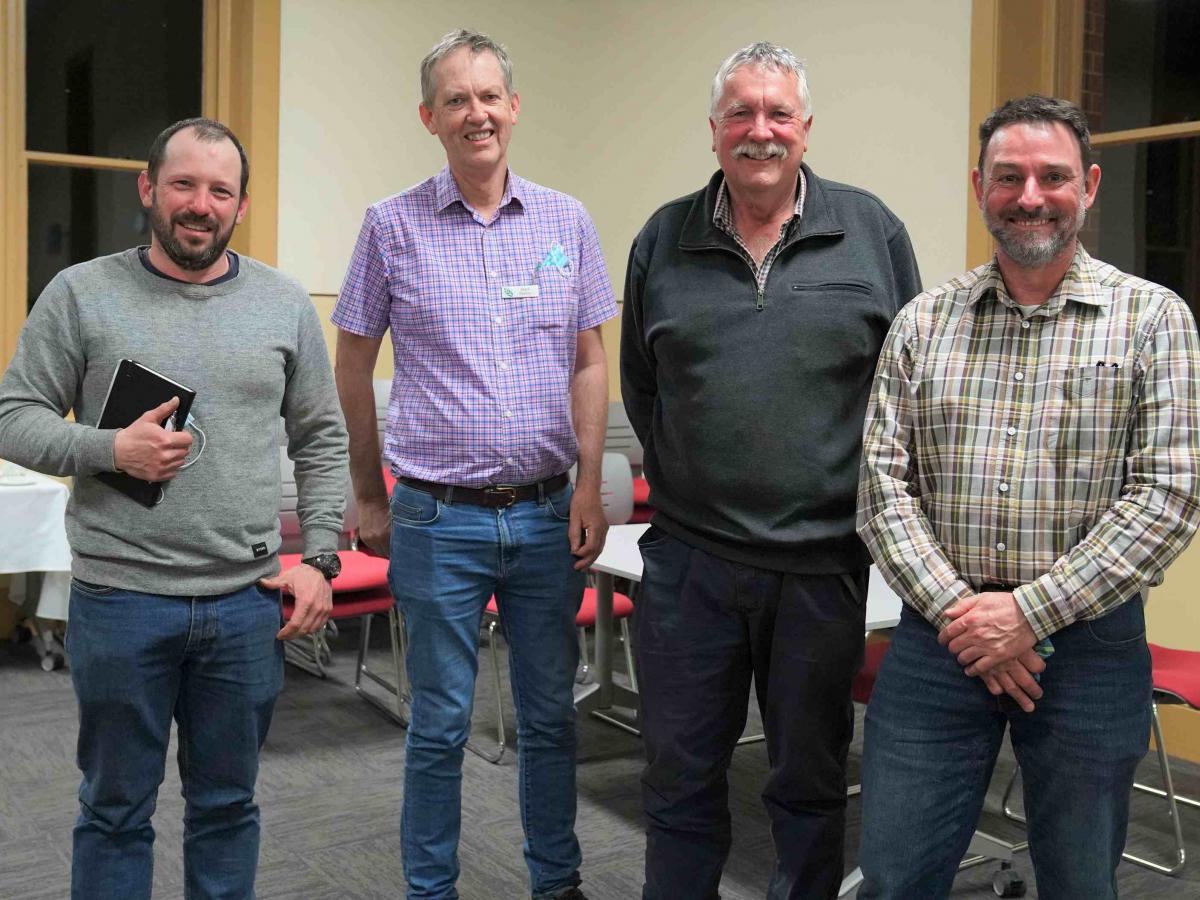
At the SA Drought Hub workshop at Roseworthy are Jarred Tilley (left), Mid North High Rainfall Zone, Kapunda; Mark Stanley, Ag Excellence Alliance, Port Lincoln; Mick Faulkner, Agrilink Agricultural Consultants/Mid North High Rainfall Zone, Penwortham; and Tony Randall, SA Drought Hub Knowledge Broker, Roseworthy.
Hundreds of South Australian primary producers, industry representatives and regional community members have had their say about their priorities for building resilience to future droughts.
The South Australian Drought Resilience Adoption and Innovation Hub has completed a series of regional workshops across the State to identify each region’s priorities to strengthen their drought preparedness and resilience.
The workshops at Wudinna, Port Augusta, Loxton, Orroroo, Roseworthy and Naracoorte were open to all regional community members – not just those who work in agriculture. More than 260 people participated in the in-person and online hybrid events.
“The workshops were extremely positive and have set a strong foundation for the SA Drought Hub’s program of activities and undertakings going forward.”Professor Chris Preston, SA Drought Hub Interim Director, University of Adelaide.
SA Drought Hub Interim Director, University of Adelaide Professor Chris Preston, said the interactive workshops were an important exercise in identifying the practices, technologies and activities the SA Drought Hub should be delivering for the next three years to support regional communities.
“It was heartening to have so many people from such diverse sectors, backgrounds and interests willingly contributing their ideas about what they believe needs to be done to increase drought resilience,” Professor Preston said.
“The workshops were extremely positive and have set a strong foundation for the SA Drought Hub’s program of activities and undertakings going forward.
“There was robust discussion at each workshop about what has helped primary producers and their communities during past droughts and what is needed to better prepare for future droughts.”
The SA Drought Hub leadership team will now review all ideas submitted through the workshops, describe each region’s priorities and then go back to the regional communities to ensure they still agree with those priority activities.
The regional priorities will form the basis of the SA Drought Hub’s activity plan, which will be submitted to the Australian Government in November.
Activities will be co-designed with regional input to facilitate adoption of drought resilience practices in farming systems through peer-to-peer learning, on-farm demonstrations and training workshops.
Professor Preston said peer-to-peer learning offered particular value in terms of sharing knowledge and experiences from previous droughts.
“There are producers in this State who have managed drought particularly well. They are a resource we can tap into to help other producers, particularly young farmers, in planning for future droughts.”
The SA Drought Hub is one of eight hubs established across the nation through the Australian Government’s Future Drought Fund.
Led by the University of Adelaide, the SA Drought Hub comprises the core hub at Roseworthy and five regional nodes at Minnipa on Eyre Peninsula, Port Augusta in the Far North, Orroroo in the Upper North, Loxton in the Riverland, and Struan in the South-East.
The SA Drought Hub comprises a comprehensive and dynamic network of 59 industry partners, including grower groups; the three South Australian-based universities; government agencies; indigenous partners; agribusinesses; research, development and extension partners; and various industry organisations.
The partners are injecting $11.47 million of cash and in-kind support into the SA Drought Hub – in addition to the $8 million of funding over four years from the Australian Government’s Future Drought Fund.
Having recently appointed Tony Randall as its Roseworthy-based Knowledge Broker, the SA Drought Hub will soon appoint a permanent Director, node coordinators and a node team leader – further boosting SA regional employment and investment.
Shopfronts for each of the nodes will also be established over the coming months.








